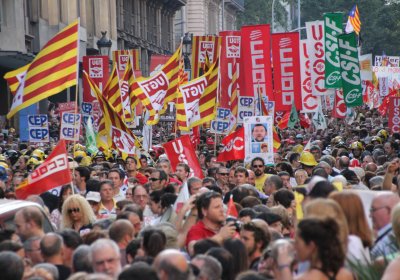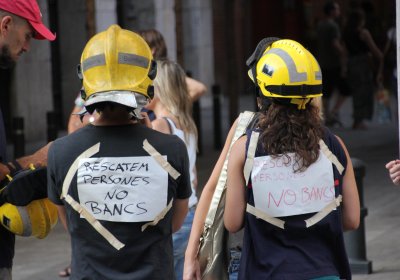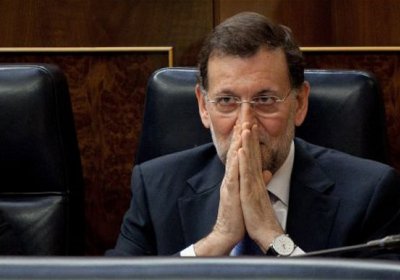The results of October 21 election for the parliament of Euskadi, the Basque autonomous community within the Spanish state, are expected to confirm the rising popularity of the left nationalist coalition, Euskal Herria Bildu (EH Bildu―Basque Country Assembly).
Regardless of whether EH Bildu tops the vote or is pipped by the conservative Basque Nationalist Party (PNV), progressive politics in Euskadi seems certain to record its best ever result.
Spain
Two recent events dramatised the state of economy and politics in the Spanish state: the Red Cross announced that this year the takings of its annual Flag Day would go to fight poverty and social exclusion in Spain, and education minister Jose Ignacio Wert told the national parliament that changes to the national education syllabus were aimed at “Spanishing” students in Catalonia.
The Red Cross decision came as a shock across the country. People knew things were bad, but that bad?
Huge protests in Madrid, brutally repressed, are now matched by another Greek general strike. Three years of the European debt crisis are producing a social and political crisis on an immense scale, with the threat of the break-up of the Spanish state.
Just as those in the global South – the great arc of less developed countries across the southern hemisphere, from South America to the Far East – have suffered years of debt crises and IMF-led structural adjustment programs, so now too is southern Europe.
On the Catalan National Day, September 11, Spanish politics suffered a huge shock: up to 2 million people ― more than a quarter of the population of Catalonia ― marched through the streets of Barcelona shouting one word, “independencia”.
It was a moment when countless Catalans (those from the four provinces that make up Catalonia in Spain's north-east) discovered that others felt the way they did ― it is time to drop Spain for a state of our own.
“In this time of crisis, when they are expropriating the people, we want to expropriate the expropriators, namely, the landowners, banks and big retailers.”
With these words Juan Manuel Sanchez Gordillo, leader of the Andalusian Union of Workers (SAT), United Left (IU) member of parliament in the Andalusian regional parliament and mayor of the rural town of Marinaleda, justified the August 7 seizure of food by SAT members from two stores of the Mercadona and Carrefour supermarket chains — the Coles and Woolworths of Spain.
When 3.5 million people protested on July 19 in more than 80 Spanish cities and towns ― against the austerity measures announced a week earlier by the Popular Party (PP) government of Mariano Rajoy ― it came as little surprise. It built on the growing wave of popular anger.
Waving banners, lighting fireworks and chanting against budget cuts, millions of people in Spain were on the march in more than 80 towns on July 19.
A huge march by striking miners and their supporters on July 12 was attacked by riot police.
Huge crowds of protesters, marching on the offices of the ministry of industry, came under attack from police firing rubber bullets. The ministry is a focus for protest because it is cutting subsidies to the mining industry by 63%.
This will lead to thousands of miners losing their jobs. Unions estimate that as many as 30,000 jobs will be scrapped.
Coalminers in north-west Spain have maintained a large-scale strike against government plans to cut subsidies to the industry. The cuts could result in thousands of job losses and the destruction of communities.
The strike began on May 29 when the Asturias region's 8000 miners voted to walk off the job indefinitely. A small number of miners locked themselves underground for weeks, while many others occupied public spaces.
Miners have come under intense attack by police and civil guard, who used tear gas, rubber bullets and batons to break up the strike.
Mariano Rajoy, the Popular Party Spanish prime minister of Spain, appeared at a special press conference on June 9 to give the nation the good news—Spain had won the lottery! A €100 billion prize in the European Bank Rescue Lotto!
Make no mistake, señoras y señores, this was not a “bailout package” or a “rescue” of the kind inflicted on Greece, Ireland and Portugal, full of those nasty “macroeconomic conditionalities” imposed by the “troika” of the European Union, European Central Bank and International Monetary Fund..
Striking coal miners blocked roads in northern Spain with burning tires and fired missiles at riot police on June 12 after officers tried to disperse their protest with tear gas and baton charges.
They were among the 8000 miners who kicked off a four-day strike on May 23 against the right-wing government's decision to slash subsidies to the sector.
Some miners have remained underground for 23 days, but thousands of others in the northern provinces of Asturias and Leon have staged mass street protests in defence of the coal industry and decent jobs.
In the week before the first anniversary of the indignado (“the outraged”) protests and camps that broke out across Spain on May 15 last year, the Spanish media was full of opinionated wishful thinking about the state of what became known as the 15-M movement.
This wasn’t just the usual malice of the right-wing media, which can always be relied upon to play up the inevitable roughness of some indignado actions ― like call-outs where only a handful respond and end up outnumbered by police and TV crews.
- Previous page
- Page 17
- Next page








